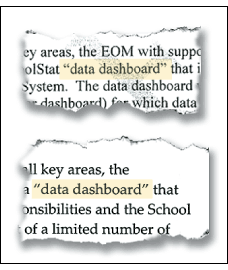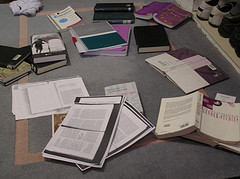Despite being a mother of zero, today I’m blogging over at Freelance Parent. If “first North American Serial Rights” sounds like a phrase out of your nightmares, or if you’ve never thought about who owns your words, I suggest you head over.
Archive for the 'intellectual property' Category
Got rights?
February 13, 2008DC government caught plagiarizing
May 9, 2007 Washingtonpost.com
Washingtonpost.com
District of Columbia mayor Adrian Fenty’s administration has been caught plagiarizing. Oops!
Victor A Reinoso, the deputy mayor for education, lifted phrases and ideas from other school districts when compiling a 31-page plan to improve the performance of students in DC schools, according to the Washington Post. The paper reported that 32 percent of the school plan was borrowed illegitimately.
Reinoso said in a statement:
“In my eagerness to compile a compendium of successful reform initiatives, plans and best practices, I didn’t properly attribute educational sources. . . . I am hopeful this oversight doesn’t diminish the public’s perception of the Administration’s intent and ability to successfully manage and reform the District’s Public School System.”
The most vocal critics of Reinoso’s actions claim that he should have tailored his recommendations to fit DC schools; among other differences, the DC system is less than half the size of the Charlotte-Mecklenburg, N.C., school system from which many of the plagiarized passages originated.
My biggest worry with this is not that the plan “doesn’t fit” the DC school district. After all, more than 60% of the document was original. But if the people in charge of the schools can’t figure out the concept of academic honesty, how can students? Or rather, how can teachers, who can’t possibly be blamed for the actions of a city official, expect to have power to punish plagiarists if this sort of thing is running rampant at the administrative level? Are we, as I’ve suggested before, thinking we’re sliding down an ethical slope to a point where plagiarism is a fact of life–or is it a move toward the utopian free exchange of information?
I also can’t help but wonder if people would still be complaining that the plan was not unique to the District if Reinoso had properly attributed his sources. After all:
In Fenty’s document, with “DRAFT” stamped on each page, strategies to create reading and math classes for middle school students, recruit teachers and use “secret shoppers” to judge how parents are treated by school employees come directly from the Charlotte-Mecklenburg plan.
The administration’s proposal for a “data dashboard” with statistical indicators to enable “the public to see, at a glance, whether current improvement efforts are on track and to respond appropriately when problems arise” is lifted from the Charlotte-Mecklenburg document.
These sound great! The Charlotte-Mecklenburg plan, which took over 100 days and 500 parents, teachers, and consultants to compile, should be emulated. Of course, the full document probably has more details that should be tailored to fit the school system, but there’s nothing wrong with borrowing good ideas. And citing their sources.
The Internet murdered the term paper.
March 27, 2007The term paper has been murdered by the Internet. Right? Jason Johnson in Sunday’s Washington Post wrote on this topic; explaining how he was rewarded at work for putting his name on someone else’s writing. “It was an open secret that my entire report, written “by Jason Johnson,” had been composed by others and that I had been merely an editor.”

“Essay Time.”
Flickr: Tim Riley.
“As kids today plagiarize more and more from the Internet,” Johnson writes, “the old-fashioned term paper — composed by sweating students on a typewriter as they sat elbow-deep in reference books — has no useful heir in the digital age.”
It is tempting to do away with research papers. Web sites like TurnItIn.com, which compare papers uploaded by subscribers to its vast database of journal articles, newspapers, web sites, and other research papers, cannot possibly catch every instance of plagiarism. What’s more, TurnItIn is hard to use (from my experiences training professors at this university to use it) and is only in use at the universities and colleges that have opted to pay for it. Clearly it has gotten so easy to plagiarize that there is almost no reason not to.
Colleges, of course, disagree: Patricia McGuire, President of Trinity University in Washington, called the column “a stunningly irresponsible case for tolerating plagiarism” on her blog.
The writer (did Jason Johnson actually write the column, or did he just cut and paste it from some sophomore’s dream of a world without plagiarism consequences, a world without the need to demonstrate any ability to write something longer than an instant message) manifested a remarkable disrespect for the ability to conceptualize and write a lucid text presenting the student’s own analysis of facts and opinions. The writer argues that we academics should simply give in to the prevalence of plagiarism and find methods other than term papers to assess student knowledge, reasoning and writing abilities (well, he pretty much dismissed writing abilities as relevant).
While spending the time to write a good research paper or essay will help hone a student’s writing skills, maybe those skills, for the average shmuck, aren’t relevant anymore. The modern student communicates through IM or short notes on friends’ Facebook or Myspace “walls.” The longest things most students have to write on a daily basis are e-mails to professors (and believe me, I have seen students write their professors or bosses using Internet abbreviations.)

I guess they’re not really quality.
Flickr:Lasagna Boy.
Who hasn’t seen blatant, painful grammar or spelling errors on store signs, flyers, advertisements? Try our “FRESH” Hot Dog’s. It makes a logophile like me cringe, but some—most?–people won’t even notice the error. The meaning behind the language parses just the same. In the corporate world, e-mails from administrative assistants, co-workers, even bosses are littered with more spelling errors. (Microsoft Word, which, of course, is used in almost every office across the country, is telling me right now that “logophile” should actually be spelled “loophole.”)
If the ability to create original writing was valued, the first generation of Internet plagiarizers would all be unemployed right now. (And let’s not forget that plagiarism wasn’t born with the ‘net. My grandfather plagiarized a term paper in dental school and copied pages verbatim from a book about the most obscure subject he could think of, the tsetse fly. Unfortunately, his professor’s specialization turned out to be the tsetse fly—without that unhappy coincidence, though, the man would have gotten away with it. He was a very good dentist until he retired, and he has never written another word on the tsetse fly as long as he’s lived.)
If nobody seems to care about good writing, why do we teach it? Having just spent the last four years of my life writing and studying writing, I feel like there must be a reason.
Some day, at your job, your supervisor will ask you to research a new technology, or a competitor, or a possible new contact. Once, that meant original work; even if the information was available, odds were it’d be on the other side of the country. But we are very close to the time when the answers to everything you might ever want to know on any subject will be a few keystrokes away. Perhaps Johnson is right, and the ability to “synthesize content from multiple sources, put structure around it and edit it into a coherent, single-voiced whole” is more crucial today than the ability to write original ideas. “Students who are able to create convincing amalgamations have gained a valuable business skill,” he writes. In addition, just like a regular research paper, a plagiarized papers will teach students how to research on the Internet, how to vet a source for accuracy, and how to work all the bells and whistles in Word. All important skills.
Not all plagiarized papers construe a “single-voiced whole.” Clever plagiarizers edit, but sloppy plagiarizers cut and paste–and get caught. But Johnson’s essay all but ignores the fact that plagiarism, sloppy or clever, caught or not, is morally wrong. If we are moving into an age where we must accept that term papers teach students how to edit rather than write, is this also a tacit acceptance of dishonesty? I hope not. I hope there is a way to accept that editing is a bigger part of modern academic work than writing without encouraging blatant plagiarism.
But there is still the issue of declining writing skills as editing skills are on the rise. Are we prepared to eat hot dog’s qwik-ly for the rest of our lives? Will Microsoft Word’s spellchecker and MSN messenger team up to destroy grammar? Will we, in the future, lol instead of laugh? Will we :) instead of smile? Will we care?
Let’s wait and see. U with me?
For a different take on the issue, see another piece from the WP: Wikiality in My Classroom.

